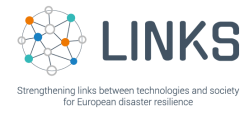
Nathan Clark, Vrije Universiteit Amsterdam
As we cross the one-year mark of the LINKS project there is much to reflect on, and to look forward to. In this first-year, and in the face of a global pandemic, partners from 15 different organizations across Europe have found ways to effectively coordinate and collaborate on the work being carried out in the project. Despite having never met in person, the consortium has come together to meet tight deadlines, to coordinate meetings and workshops, to set the conceptual and methodological foundations for the research, and to create a common overall vision for the project. It is the overall objective of the project to strengthen links between technologies and society for improved disaster resilience. The importance and complexity of these socio-technical links are now also reflected in our daily work and lives, as colleagues and families stay connected through virtual mediums. In this current reality, we have and will continue to find innovative ways strive together and meet our objectives.
In this issue, we discuss the main activities which LINKS has been working on from January to May 2021, and highlight our plans for the future. As a means of achieving the overall LINKS objective on improving societal resilience, LINKS is equally focused on producing sustainable advanced learning on the uses of social media and crowdsourcing (SMCS) and disasters. In sections two and three of this newsletter, our colleagues from Vrije University Amsterdam introduce what learning means in the context of LINKS, who learning is for, and how it may benefit different stakeholders through two key LINKS outputs: the LINKS Framework and the LINKS Community Center (LCC).
The foundations for the learning dimensions of LINKS were established in the first six months of the project by our partners from the University of Florence, the University of Copenhagen, and the Safety Innovation Center. They established the three core knowledge bases in the project focusing on social, institutional, and technical dimensions of SMCS in disasters. Those partners are now busy building on the knowledge bases to develop three unique methodological approaches for the upcoming research in the project. Section four of this newsletter, highlights the ways in which the methodological approaches will be applied within and across five cases in Europe. This will involve working with the local partners to examine flooding in Denmark, droughts and terrorism in Germany, earthquakes in Italy and industrial hazards in the Netherlands. The research in those cases is planned in different phases of the project, and is set to officially begin from November of this year. The practitioner partners in LINKS play a crucial role in the design, organization, and execution of the local case work. In section four of this newsletter, we profile the practitioner partners from the Dutch industrial hazards case, Security Region South Limburg (Veiligheidsregio Zuid-limburg) and Sitech/Chemlot, and the German terrorism case, the German Police University (Deutsche Hochschule der Polizei), to learn a bit more about their organizations and their role in LINKS.
Another core objective in the project is building a network of stakeholders to contribute to the knowledge and learning processes enabled by LINKS. The establishment of this LINKS Community has already started with the involvement of the partners and participants in the local cases, and is now expanding into the broader European crisis management community. Our colleagues from the European Organisation for Security provide an overview of opportunities available to stakeholders by joining the LINKS Community, such as taking part in future workshops and engaging in activities in the LCC, along with a linked questionnaire for anyone wishing to join and learn more about the Community. We encourage stakeholders from all different backgrounds and disciplines with an interest in SMCS and disasters to reach out to us – we are eager to exchange knowledge and engage with new perspectives, experience and ideas.
As part of our efforts to develop the Community and to disseminate our work and outputs in the project, LINKS has also been very active in our engagement with associated partners, projects, networks and initiatives. In the last section of this newsletter, our partner for Links Campus University covers some of the key events and initiatives taking place in the project. Among the most notable activities are a Policy-to-Practice workshop held together with the Disaster Preparedness and Prevention Initiative for South Eastern Europe (DPPI SEE) in April. The workshop brought together 16 participants from 9 countries in the Balkan region to discuss experiences with and potentials for procedures, practices and guidelines on the effective uses of social media and crowdsourcing (SMCS) for different phases and types of disasters. LINKS has also participated in a number of events organized by the Commission, including an event on 10 March on Scientific Support to the Sendai Framework for Disaster Risk Reduction (SFDRR) organized by the Community of European Research and Innovation for Security (CERIS). LINKS presented how the project’s policy targets align with SFDRR priority areas of understanding disaster risk (priority 1), strengthening disaster risk governance (priority 2), and enhancing disaster preparedness (priority 4), highlighting key findings in the deliverables on the knowledge bases (found here). Last but not least, LINKS continues to engage with the DRS01 sister projects BUILDERS, ENGAGE and RESILOC, recently organizing the first cross-project working group to discuss approaches and potential collaboration among the projects around the theme of vulnerability.
We are looking forward to the upcoming summer, which brings the first project review, as well as planning and preparation for the case-based research which will begin in the autumn. We are also looking forward to a time in the not-so-distant future when the consortium will also have the opportunity travel and meet in person. There are no replacements for a good white boarding session followed by a glass of wine together at the end of the day.

